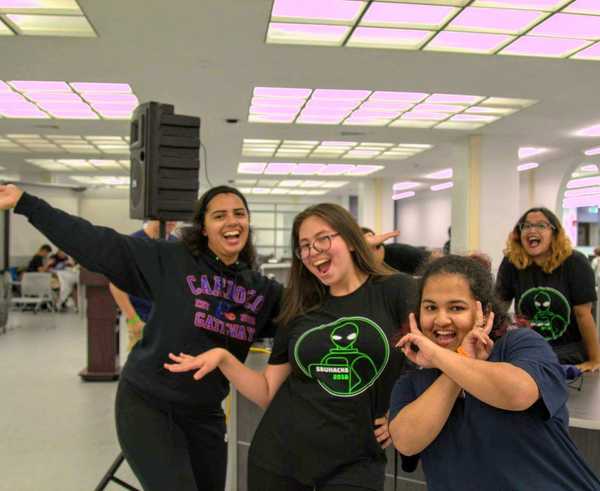A part of me is hesitant whenever someone asks me, "Where are you working this summer?" I am often reluctant to reply, "An immigration attorney's office", so I usually defer to answering, "I am interning at an attorney's office" with no mention of immigration whatsoever. The reason for this is not because I am shy or embarrassed about my work but because I have been met with overwhelming cynicism, hate, and ignorance from others when I tell them that I work for a lawyer who defends immigrants. And that is why I do not communicate with others outside of my close family and friends the intricacies of working at an immigration law firm.
In October, I participated in a week-long service trip in San Diego, California. Throughout the week, I witnessed the reality of life nearly twenty miles from the southern border along Mexico by engaging in a tour of the southern border by Customs and Border Patrol (CBP) officers, placing gallons of water in the desert nearby the southern border with a non-profit organization known as Border Angels, and listening to the stories of the Chicano community in Logan Heights, a neighborhood outside of San Diego.
This experience not only transformed me but also left me scarred. I still wince at the mental image that remains of clothes torn off and left in the desert miles from the southern border, and the shells of shotguns and targets with bulletholes torn on the ground by residents who aimed to scare migrants passing through the desert. For weeks, I could not refrain from sobbing uncontrollably whenever I was alone thinking about the people who crossed that same desert I was in. I thought about the privilege I have as an American citizen and all the benefits that came with that status. Never did I have to sleep with one eye open in fear of an Immigration and Customs Enforcement (ICE) officer coming in the middle of the night to take me or my family members. Never did I have to endure my day-to-day activities in a migrant detention center without a blanket or a toothbrush. Never did I have to experience a second of my life separated from my family members.
I came out of this experience in San Diego seeing a different side to immigration - a human one. I stopped referring to people as statistics in charts and graphs, and I began to humanize data. I refrained from seeing immigrants as "infestations" and "criminals", and I began to view them as human beings whose stories deserved to be heard instead of twisted, manipulated, and generalized. As you can see, immigration is so much more than a political issue to me--it is a human one. It is the reason why I try my absolute best to give my internship my utmost energy and effort. While I have always thought of myself to be a hard worker, I realized that there is no room for slackers when it comes to immigration law. Because every case represents an individual person's life here, and I think that deserves all of my energy and attention to fight for and support to the best of my ability.
I will be very candid - it is an extremely difficult time to be working in an immigration law office. The attorney whom I am interning for will often joke with me, "Why do you want to be here so much? It's depressing." As much as she likes to kid around with me, I can sense her frustration and tireless efforts to grapple with a merciless immigration system. More likely than not, our cases-regardless of how "good" they appear- are outright rejected by immigration judges in the court system. In more occasions than one, I have witnessed government attorneys mercilessly tear apart our clients during their individual testimonials, objecting to every inch of our client's story no matter how gruesome, horrific, or appalling their experiences in their home countries were. I have listened to too many immigration judge's decisions that cite previous Attorney General Jeff Sessions' Matter of AB decision which overturns a precedential decision, Matter of ARCG, that recognized victims of domestic violence as a cognizable particular social group qualifying for asylum.
Too many times have I observed appointments with clients who tell the story of their horrific instances of persecution in their home country at the hands of oppressive governments, complacent police, abusive partners, or violent gangs (maras). But when that client leaves, I do not think they can process the uphill battle that is ahead for us and them. They have no idea of the immigration system that tells them their story just "isn't good enough" to receive any benefits in the United States.
I realize every client is not seeking asylum. I have witnessed cases referring to benefits much more complex, including but not limited to DACA recipients, Dreamers, TPS, CAT, Withholding of Removal, Permanent Residents, Cancellation of Removal, Petitioners & Beneficiaries, and Green Card Holders.
I am reluctant to share these emotionally painful details of my internship with those who do not attempt to understand the reality I have experienced in the office for the past few months. Despite my direct participation in the immigration system in more ways than one, I have still been told that I am too young to really understand what illegal immigration does to this country. I have had to hold my tongue when people have murmured, "The immigrants don't work hard". I have had to nod my head when people tell me, "I think what you're doing is great, BUT I think people should follow the law instead of 'cutting the line'." It's hard for me, as a talkative person, to not answer, "Well, applying for asylum is legal" or "An undocumented individual who has been here for over ten years and whose absence would present an unbearable hardship to his or her United States Citizens or permanent resident direct family members or spouse is obeying the law by seeking Cancellation of Removal" or "A DACA recipient who came to the United States along with their parents as an infant who has lived in the United States for an overwhelming majority of their life is obeying the legal procedures by adjusting their DACA application every couple of years" or "An individual with TPS may not have a pathway to citizenship but they are still a lawful resident".
I also realize that not every case involves a "picture-perfect" client. I have observed interactions with clients who do not inform our office about pending criminal charges and arrests, clients who seek relief but have failed to communicate with their citizen family members in the US, clients who have gone "off the grid" and disappeared, clients who have taken out their frustration at the attorney, clients who have "bad" asylum cases where they have not been persecuted or qualify for any of the benefits. However, it is not my job to assess whether or not someone deserves to stay in the United States- that is up to the immigration judge and the Board of Immigration Appeals (BIA) to adjudicate each case fairly, equally, and justly.
However, it is our job as the attorney to choose who we represent, and while we believe all individuals should have legal representation, it is not our obligation to provide legal assistance to an individual who purposefully lives "off the grid", does not pay taxes, and does not wish to contribute to the well-being of this country. To generalize that all undocumented individuals fall into this category is unfair and false. Although I have only been working in an immigration law office for a couple of months, the attorney whom I work for can tell you that these encounters are rare.
Since beginning my internship, it has taken a lot from me to deal with the negativity surrounding our immigration system. Often times, that negativity has turned into people voicing their anger and projecting it onto me. Or even worse, that negativity has turned into times when disturbing images such as that of Oscar Martinez Ramirez and his daughter Valeria invoke the worst kind of sadness within me. Yet, the sadness I get from viewing all the overwhelming intricacies of my internship never let me question the validity of my work. Never have I doubted the work I do or the people whom I help because I not only believe but I know it is the morally right thing to do. Perhaps not every case gets granted, but I believe that every case has the right to be heard and adjudicated impartially. If you disagree, then I guess you take a gander at the laws engraved in Title 8 of the United States Code Chapter 12 which entitle immigrants to various benefits based on their ability to fit specific qualifications.
So if I struggle to mention that I am working at an immigration law office this summer, please try to understand. After some time, I have begun to recognize which conversations are necessary, which comments are worth replying to, and which individuals are open to listening. At the end of the day, people can think their negativity has "won" their episode of political banter on Facebook, that their remarks are always "right", and that I will "grow out of this phase" as a young person. At the end of the day, it does not matter to me what they negativity is bred amongst others because I believe my work has purpose and necessity in this world. I believe that every story should be heard. I believe that everyone deserves the chance to fight for their case. So if I don't explicitly tell you where I am working this summer, know that it's not because I'm too quiet...it's because I'm just too passionate.



















